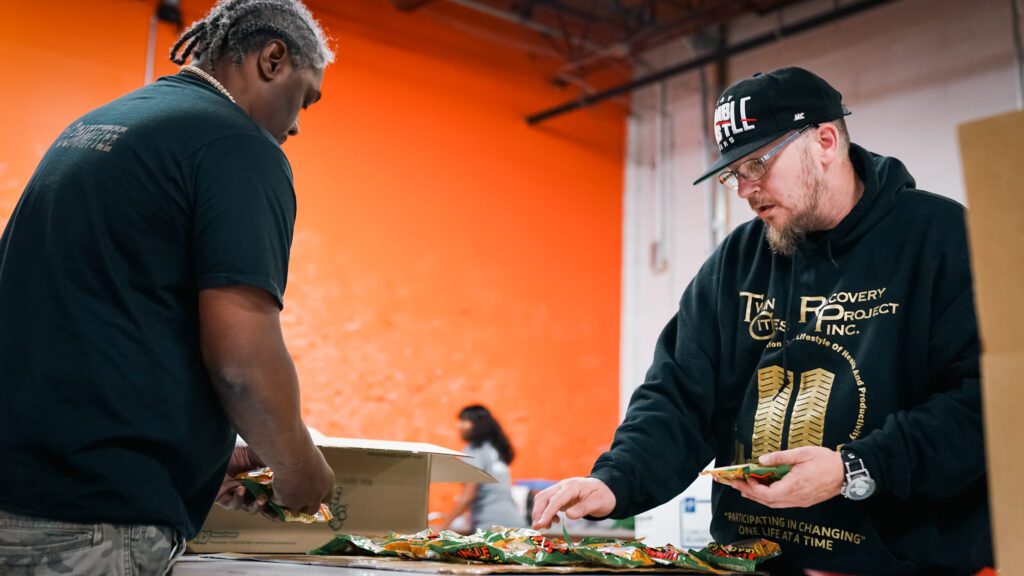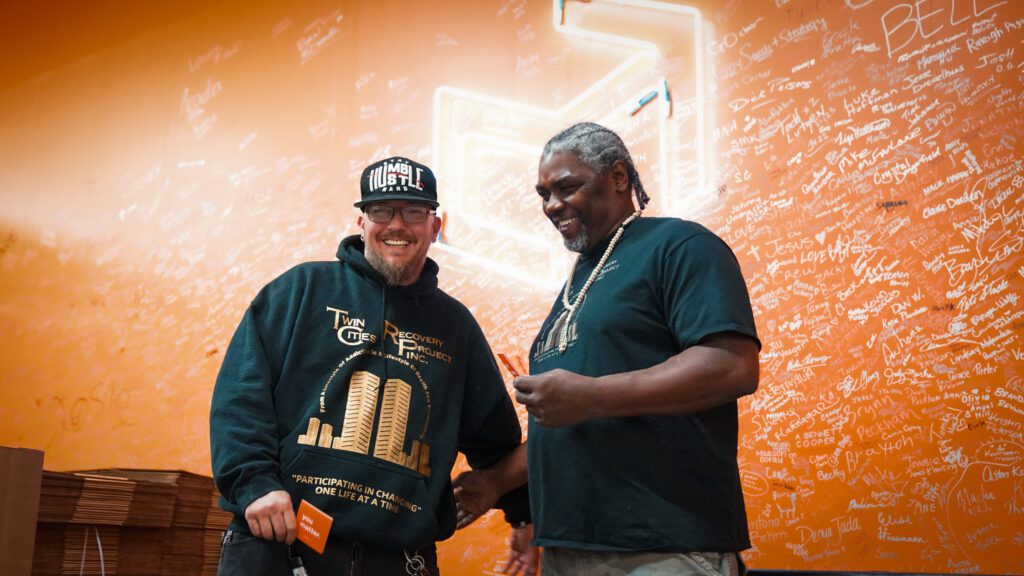There’s a saying that you can’t change the world from a distance, you have to get close enough to feel it. That’s exactly what Joel Baldwin and Abu As-Sidiq do every day.
As Peer Recovery Specialists and Outreach Coordinators with our MATTERbox partner, Twin Cities Recovery Project, Joel and Abu spend their days on the streets of Minneapolis and St. Paul, meeting people in the hardest moments of their lives.
They go where few others will. Encampments. Shelters. Street corners. Recently, we sat down with them to hear their story. As Joel spoke, his hands moved, part emphasis, part energy he couldn’t contain. Abu nodded quietly beside him, letting the pauses fill with weight. You could feel that what they were talking about wasn’t work. It was life.
For nine years, Twin Cities Recovery Project has reached more than 500 people a week, connecting them to resources, recovery, and hope. “We’re boots on the ground,” Joel said. “We meet people exactly where they are.”
When local companies pack MATTERbox Snack Packs and Hope Packs, Twin Cities Recovery Project is one of the partners who takes those meals, hygiene kits, and wound care supplies straight to the people who need them most. What might look like a simple bag of food or bar soap becomes something much more profound, a bridge of connection, dignity, and trust. “The wound care supplies have become critical to our operations,” Joel explained. “We serve about 500 people a week, but that number has jumped. We go out three times a week on the South Side and five days a week on the North Side. These supplies help us treat wounds, prevent infection, and sometimes, save lives.”
Abu shared how even something as simple as a Snack Pack can open the door for change. “We use them with the youth at the library,” he said. “It gives us a chance to talk, to connect. Some of these kids aren’t ready to understand what recovery is yet. But a snack? That they’ll take. And in that moment, we plant a seed. Recovery looks different for everyone.”

Sometimes, what opens the door isn’t just food, it’s survival. “Even sanitizer has saved lives,” Joel said. “There were nights so cold, people used sanitizer as heat. We’d give it to them, and they’d light it in a small dish. It became the only source of warmth. We were the only ones coming out with anything that could keep them warm. That stuff literally saved people’s lives.”
For those experiencing homelessness, hygiene is often overlooked but essential to dignity. Joel remembers what it felt like when he was unhoused himself. “You’d go weeks without being able to shower,” he said. “You don’t have soap. You don’t have anything. I’ve seen people break down and cry when we hand out Hope Packs. Because those basic things, they restore dignity. And I can honestly say, those packs are helping people get sober. When you feel human again, you start to believe change is possible.” He smiled as he added, “And the Snack Packs? You know what they say, the way to a man’s heart is through his stomach.”
Each MATTERbox includes a handwritten You Matter note. Simple, personal, a few words from the person who packed it. Joel will never forget one note in particular. “I gave a snack pack to a woman, she’d been a sex worker, really struggling, and she just started crying,” he said. “I asked, what’s wrong? And she showed me the note she got. It said, ‘You are beautiful.’ She told me, ‘This meant everything to me.’ She’s sober now. That note was one of the things that opened her eyes. That’s how powerful a few words can be.” He paused, his voice steady with conviction. “That’s what our outreach is built on. We just come out there and love on people until they love themselves. That’s it.”
When asked what keeps them going in such difficult work, Joel and Abu both pointed to the same truth. “When I help others, I’m helping myself,” Abu said. “This gave me a group of people with the same goal, to stay clean and live with purpose.” Joel nodded. “Same for me. Giving back is what keeps me sober. I go back to the same encampment I used to live in. I talk with the people I was just with. I made it my mission to help my community. I’ve never been accepted anywhere like I was there. So coming back, being able to help, it’s everything.”
As they reflected on the people they now serve, the same people they once were, we asked what they’d write in their own You Matter note if they could give one out today. Abu didn’t hesitate. “This too shall pass,” he said. “When you’re going through the fire, and you put the work in, it passes. You just have to keep going.”
Joel’s voice softened. “Mine would say, You are loved. Because that’s what I needed to hear when I was out there. I didn’t think I mattered. I didn’t think anybody loved me. I didn’t think I was capable of being loved. So having those messages, man, they matter. I love that message. You matter. It’s everything.”
Before we ended, we asked what they’d want to say to the volunteers who pack MATTERboxes. Their gratitude was immediate. “Thank you,” said Abu. “Just thank you.” Joel leaned in. “What you’re doing is more important than you know. We couldn’t do what we do without you. The love you bring when you pack those boxes, it comes through in the product. It’s the first place I’ve ever seen love come through a product. Keep doing what you’re doing. Because it matters. And it’s felt out here.”
At the end of the interview, we handed Joel and Abu a You Matter note of their own. Because sometimes, the ones who give the most need to be reminded, too. On the back, it read: “You give hope, dignity, and purpose to so many. Never forget, you matter, too.”
And that’s the heart of it all.
When love moves from words to action, when hope meets humanity in a moment of connection, change happens. Because every person matters. Every story. Every struggle. Every act of love.
That’s what makes the MATTERbox more than a box. It’s a reminder of what’s possible when we keep living out the truth that started it all: you matter.
